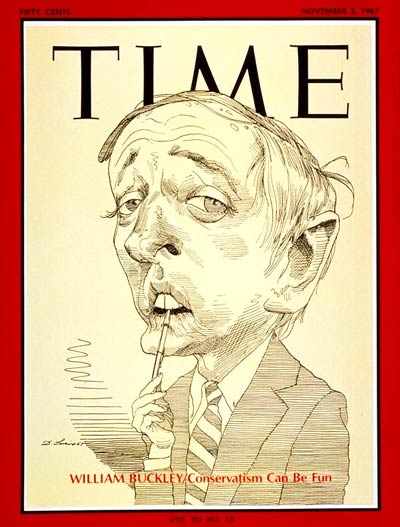
Milestone moments do not a year make. Often, it’s the smaller news stories that add up, gradually, to big history. With that in mind, in 2017 TIME History will revisit the entire year of 1967, week by week, as it was reported in the pages of TIME. Catch up on last week’s installment here.
William F. Buckley Jr., this week’s cover-story subject, was somewhat baffling to both his adherents and his critics. At this moment of great political upheaval, he was one of the most significant conservative voices in the U.S. — but he didn’t always seem the part. As Buckley himself put it, “I feel I qualify spiritually and philosophically as a conservative, but temperamentally I am not of the breed.”
One thing that could not be confused: he was having a moment. Between newspaper and television appearances, he and his opinions were everywhere.
As the cover story explained, Buckley’s popularity was, somewhat ironically, a product in part of that 1960s moment. In the past he had turned the mainstream off, with his defense of McCarthyism and other extreme views, but as the world got weirder (and the ultra-conservative movements of the 1950s receded) many former nonbelievers began to feel that his ideas were just what the U.S. needed. Plus, that moment in history seemed to require a little bit of moderation, as TIME suggested:
Though he resists suggestions that he has become a liberal in any sense, Buckley admits to being “less insistent on rhetorical purity than I was a few years back. It’s one thing to complain that Government has got into a situation. It’s another to keep repeating it all your life. In an ideal society, I’d be against compulsory arbitration; yet I think people are a bore who create a theology around private enterprise.” It has been a firm conservative tenet that the state must be kept as limited as possible. Yet that belief has run smack into the conservative demand to fight the cold war as vigorously as possible. “Today, as never before,” concedes Buckley, “the state is the necessary instrument of our proximate deliverance.”
Given Buckley’s newfound appeal among non-conservatives, it was perhaps no surprise that, as he told TIME, most of his hate mail came from the right rather than the left.
Secret agency: Prompted by the release of the book The Codebreakers, this story in the national news section took a look behind the curtain at the National Security Agency, a “cathedral of cryptography” and “official Washington’s least-known edifice.” Though the work of the NSA was only getting more important as the computer age dawned, it remained far more shrouded in secrecy than the CIA — even though, TIME pointed out, its annual budget was about twice that of the better-known espionage center.
Heady stuff: One side-effect of the trend toward natural hair styles for women? The return of the hat, though young women couldn’t agree on whether the point of a great hat was to hide one’s face or to attract extra attention to it.
Chemical weapons: As college students and others across the country protested the Dow Chemical Co. and attempted to prevent the napalm-maker from recruiting on campuses, TIME took a look at the effort and concluded that it was perhaps misguided. Though the magazine glossed over the ethical questions specific to napalm’s use in the Vietnam War (many of which were not yet clear to most Americans at that point), it concluded that the protests were not having much of an effect and, moreover, would be more logical if directed elsewhere. “So far this year, Dow has supplied the Government with $5,170,000 worth of napalm—less than one-half of 1% of Dow’s $1,034,000,000 world-wide sales,” the article noted. “By contrast, Lockheed Aircraft supplied $1,531,000,000 worth of equipment to the Defense Department last year. Only about 100 of Dow’s 35,000 employees are involved in making napalm.”
Drink data: This story on the increase in drinking among American women — an issue that remains newsworthy today — mostly focuses on how that trend was reflected in advertising strategy, but this fact may be most shocking to modern readers: “Until 1958, under the code of the Distilled Spirits Institute, the industry trade organization, women models could not appear in liquor advertising.”
Great vintage ad: This Swiss cheese/Swiss watch joke is pretty silly.
Coming up next week: Life in the USSR
More Must-Reads From TIME
- The 100 Most Influential People of 2024
- The Revolution of Yulia Navalnaya
- 6 Compliments That Land Every Time
- What's the Deal With the Bitcoin Halving?
- If You're Dating Right Now , You're Brave: Column
- The AI That Could Heal a Divided Internet
- Fallout Is a Brilliant Model for the Future of Video Game Adaptations
- Want Weekly Recs on What to Watch, Read, and More? Sign Up for Worth Your Time
Write to Lily Rothman at lily.rothman@time.com